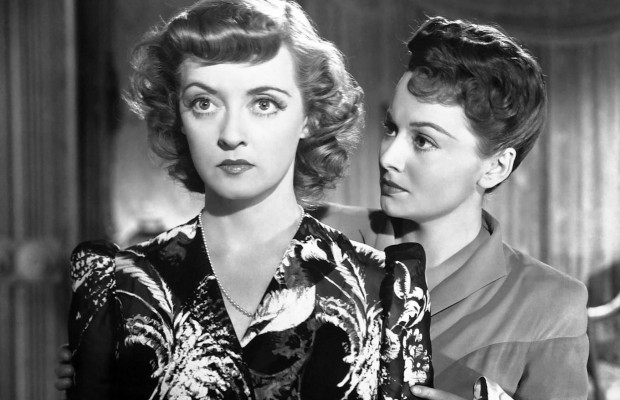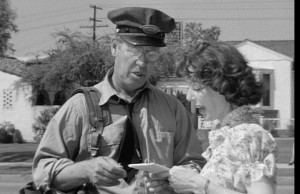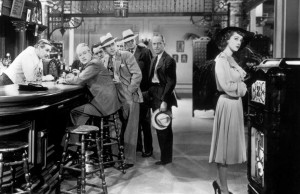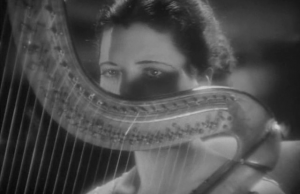In This Our Life (1942)

The Toronto Film Society presented In This Our Life on Monday, September 30, 2013 in a double bill with Guilty Hands, as part of the Season 66 Monday Night Film Buffs Series.
 |
In This Our Life (1942)
 Run time: 97 min Run time: 97 min Rating: 7.3 Rating: 7.3 Genres: Drama Genres: Drama Director: John Huston Director: John Huston Writers: Howard Koch, Ellen Glasgow Writers: Howard Koch, Ellen Glasgow Stars: Bette Davis, Olivia de Havilland, George Brent Stars: Bette Davis, Olivia de Havilland, George Brent |
| Storyline A young woman (Stanley Timberlake) dumps her fiancée (Craig Fleming) and runs off with her sister’s (Roy Timberlake) husband (Peter Kingsmill). They marry, settle in Baltimore, and Stanley ultimately drives Peter to drink and suicide. Stanley returns home to Richmond only to learn that her sister Roy and old flame Craig have fallen in love and plan to marry. The jealous and selfish Stanley attempts to win back Craig’s affections, but her true character is revealed when, rather than take the rap herself, she attempts to pin a hit and run accident on the young black clerk (Parry Clay) who works in Craig’s law office. Written by Bonnie Barber <bonbar@mit.edu> |
|
| Details: Release Date: 16 May 1942 (USA) |
|
| [youtube]http://youtu.be/72EL9JER2rM[/youtube] | |










Bette Davis is perfectly cast here as a model sociopath – attractive, seductive, fawning – but always focused on her own needs and desires to the ultimate detriment of the feelings of others. I won’t rehash the plot here. Although Davis gives a stellar performance, I feel she is overshadowed by the strong and intelligent performance of co-star, Olivia de Havilland. The entire cast works well together and Huston’s direction is solid and brisk. The obvious lecherous physical attraction between Uncle William (Charles Coburn) and Stanley (Davis) is well handled. Two of their scenes together are brilliantly acted – in the middle of the film where Davis is trying to wheedle money from her uncle to relocate and close to the end when he is dying and she cruelly rejects him for choosing not to help her. Their ease with each other and playful repartee seems almost improvisational.
I was most impressed with the assured performance of the young African American actor, Ernest Anderson, who plays Parry – and does a beautiful job. This fine young actor made only 19 films, which stretched between 1942 (this was his first) and 1970, most of them "uncredited." Note he appeared again with Davis in WHATEVER HAPPENED TO BABY JANE? He lived to be 74 so must have either done little acting or primarily appeared on stage or television. It is sad that the racial prejudice rampant in the film seemed to have affected his own acting career- a poignant irony.
This is a grand melodrama and both fun and entertaining to watch. The script is pure Tennessee Williams plotting – without the poetry. A must for fans of either Davis or deHavilland.
A critical and commercial flop when first released, I’ve always thought "In This Our Life" (***1/2 out of ****) one of the most daring and powerful melodramas to come out of a major Hollywood studio in the 40’s. In his autobiography director, John Huston commented: "There is something elemental about Bette (Davis)-a demon within her which threatens to break out and eat everybody, beginning with their ears-I let the demon go." This famously volatile actress is at her gutsy best as a headstrong vixen who steals her sister’s husband and drives him to suicide. She then attempts to steal her sister’s new betrothed out of jealousy and then goes on to try to pin a hit and run accident on an innocent black youth. Amazingly, Davis manages to evoke a weird kind of sympathy for this anti-heroine (a special talent of hers). This picture was ahead of its time in several respects. It was one of the first to portray a young black man who was intelligent and ambitious, rather than in the usual servile role. Davis and Charles Coburn as her lecherous old uncle achieve a wickedly funny rapport in their scenes together that dare to suggest an incestuous attraction, at least on his side. Olivia De Havilland manages to give the role of Davis’ put-upon older sister a great deal of dignity and backbone. She excelled at giving substance to "good woman" roles. (Oddly enough, the sisters are named "Stanley" and "Roy" in the script.) This speedily-paced film runs for 98 minutes and every one of them is packed with interest and excitement. As if this weren’t enough, there is one of Max Steiner’s most sophisticated and highly charged scores to drive it all along. Highly recommended.
It kills me when some reviewers of this dynamic masterpiece mouth the same criticisms of Bette’s detractors: that she overacts like heck and chews up the scenery. Bette is mainly responsible since she always attacked "In This Our life" and "Beyond the Forest" as "lousy movies." And people who’ve never even seen either one just go on parroting her opinion. Well, Bette was never the best judge of her work. "In this our Life" contains her most electrifying performance besides that of Rosa Moline in "Beyond the Forest." She brilliantly creates the portrait of a psychopathic Southern Belle. Her final scene with her lecherous uncle (Charles Coburn) is one of the most powerful scenes in movie history. I watched this on the big screen of the old Regency Theater here in Manhattan and the packed theater were simply galvanized by this sequence and everything else about In This Our life. What’s especially memorable is the seedy, decaying house she and her sister (Olivia d’Havviland" live in. The introduction of the racist angle where Bette tries to blame her killing of a pedestrian on an innocent young black guy is still shocking. NO wonder it’s gained such a strong following among modern black viewers. This is one of my all time favorite classics from Hollywood’s golden age. Bette is the greatest and you’ll never forget her here in one of her greatest performances. Just try to find any actress today who could do what she did in the final close-ups of her in the death car. Bravo Bette! And to director John Huston who let her do it her way.
"In This Our Life" dared to point out some issues not discussed by the Hollywood of the 40s. It shows a great director, John Huston, working at the top of his craft on the interesting adaptation by Howard Koch.
Stanley, the girl at the center of the story has it all. She is the favorite niece of the man who was responsible for ruining her father, a gentle soul beaten by the Great Depression. Stanley is a spoiled woman who couldn’t care less who she hurt, let alone that is her own sister the one that will suffer because of her actions.
On the other hand, Roy, the good sister, is all kindness; she is just the opposite of Stanley. When Stanley decides she wants Peter, Roy’s husband, she doesn’t hesitate one second. She takes him and runs away to a life that proves not to be all what she imagined it would be.
Life intervenes in Stanley’s life in tragic ways. First with Peter, the man he shouldn’t have taken away from her sister, and then when trying to get back with Craig, she causes the death of a young girl when driving under the influence. This would have been a sobering experience for anyone, but Stanley is beyond repentance. Stanley, is a coward who will do anything to get away with murder.
Stanley was a role tailor made for Bette Davis. Her take on this impudent girl is perfect. Ms. Davis shows how good she is in small details that convey her understanding of her character. Ms. Davis reflects all the emotions Stanley is going through with her expressive eyes. One look at her and we know what this woman is capable of.
Olivia de Havilland makes an impression by playing the good sister, Roy. Ms. de Havilland is an actress that always played convincingly in everything she did, as is the case here. Her inner strength is her best asset. Roy is loyal to the point of sacrificing her own happiness and lets her sister take what she loves most.
The strong cast behind the principals is equally excellent. Dennis Morgan is Peter, the man blinded by Stanley. He will leave his adoring wife for a woman he ends up detesting. George Brent, is the kind Craig, the man jilted by Stanley who finally finds love again with Roy. Charles Coburn plays Uncle William with his usual panache. Frank Craven is Asa, the man cheated out of his fortune. Ernest Anderson makes an impression as Parry, the young black man with ambitions to improve himself. Hattie McDaniel only has a couple of key scenes where she shines. Billie Burke and Lee Patrick are seen in minor roles.
The musical score by Alfred Newman enhances the film. Ultimately it’s John Huston who shows a clear understanding for the material and who gets excellent performances out of everyone.
LOVE THIS MOVIE